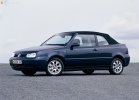Krash Test Volkswagen Golf IV Cabrio 1998 - 2002 Cabriolet
Krash Test Volkswagen Golf Cabrio 1998, 1999, 2000, 2001, 2002: Laborator Car Safety Assessment: Rating in points, a test report (photo and video of the crash test)
25%
Driver and passengers
17%
Pedestrians
Protection of the driver and passenger
 Frontal blow, driver |
 Loba blow, passenger |
 Side blow, driver |
|
Children's holding devices
| Child up to 18 months | No information |
| A child over 3 years old | No information |
Safety of pedestrians
 |
|
Comments:
With the frontal and lateral strikes, the body of the body showed himself well. One of the children's chairs used in the test was equipped with an ISOFIX attachment system, but difficulties arose with its installation in the car. The manufacturer told experts that all problems were eliminated. The protection of pedestrians turned out to be contradictory: better than average in places of impact of the head, but very bad on the front edge of the hood and bumper.Frontal blow:
When hitting, the passenger salon retained integrity, demonstrating a relatively low degree of compression. The front cushion of the driver showed a good result, providing constant contact with his head. The results of the chest protection for the front passenger were worse than for the driver, so they were taken into account when setting the final assessment. The manufacturer placed in the steering column casing protection made of multi -layer steel and filler, this was supposed to protect the driver’s knees, but these protective elements did not fully deal with the task assigned to them, enduring the upper part of the legs.Safety of passenger children:
Children's seats of various types took part in the test, one of which was equipped with an ISOFIX attachment system, which provides a more reliable installation of these accessories than traditional, fixed using a seat belt. However, problems arose with this chair: it was very difficult to fix it correctly, and the correct installation indicator is almost not visible. The rear seat belts were equipped with automatic locks for attaching the chairs of a conventional design, but the experts did not find the instructions for their use, so this system was not used in the test. The cabin was a reminder of the presence of a passenger’s front pillow, but it did not inform about the inadmissibility of the installation of the children's chair “against the direction of movement” on this place.Side blow:
The side pillow of safety protected the chest and abdominal parts of the driver. The driver's head hit the side door rack and the upper seat belt. With a more rigid blow, the driver should protect the shock -absorption filler in the strut sheathing.Pedestrian safety:
Protection of the head of adult pedestrians and children was better than average, but the bumper and the front edge of the hood practically did not soften the blow to the legs.General information about the car
| The location of the steering wheel | Left |
| Tested model | VW Golf 1.4 |
| Type of body | 5-door hatchback |
| Year of data publication | 1998 |
| Curb weight | 1140 |
Safety system equipment:
| Front seat belts | There is |
| Front seat belts load limiters | Not |
| Front Pillow of Safety of the driver | There is |
| Passenger front pillow | There is |
| Side airbags | Not |
| Side pillows of head safety pillows | Not |
| Knee -off pillow and legs of the driver | Not |











